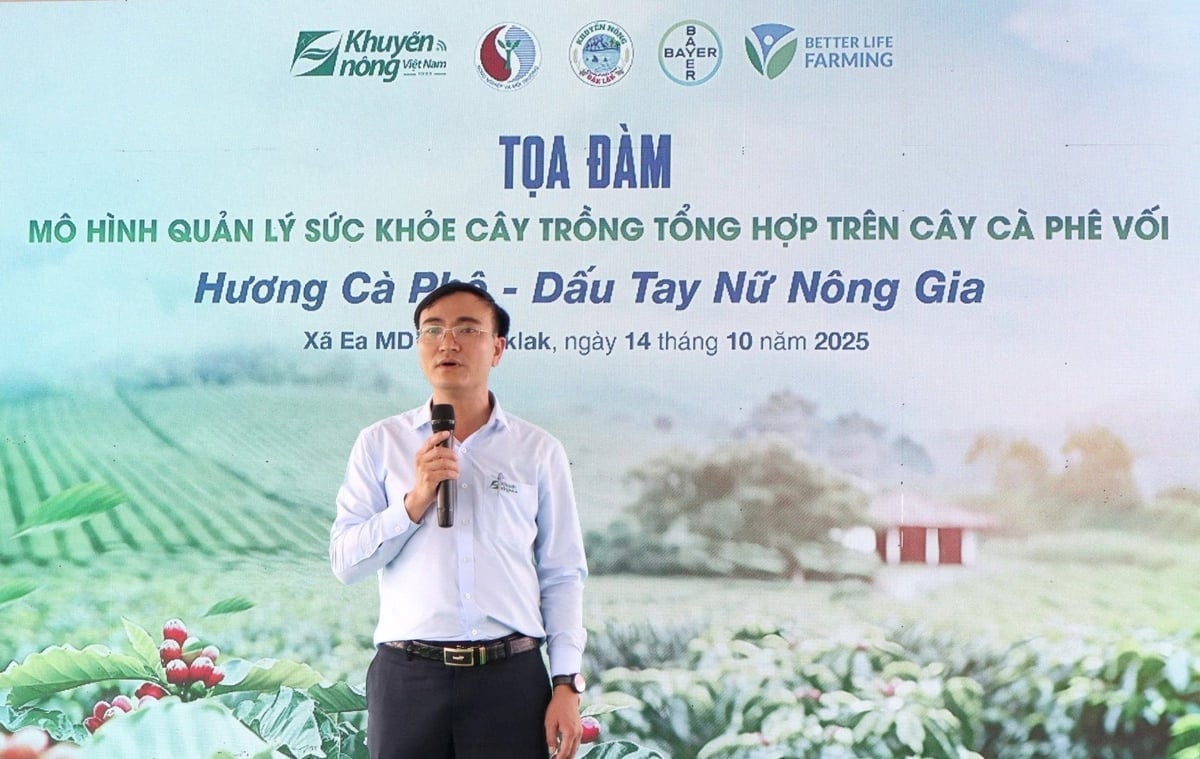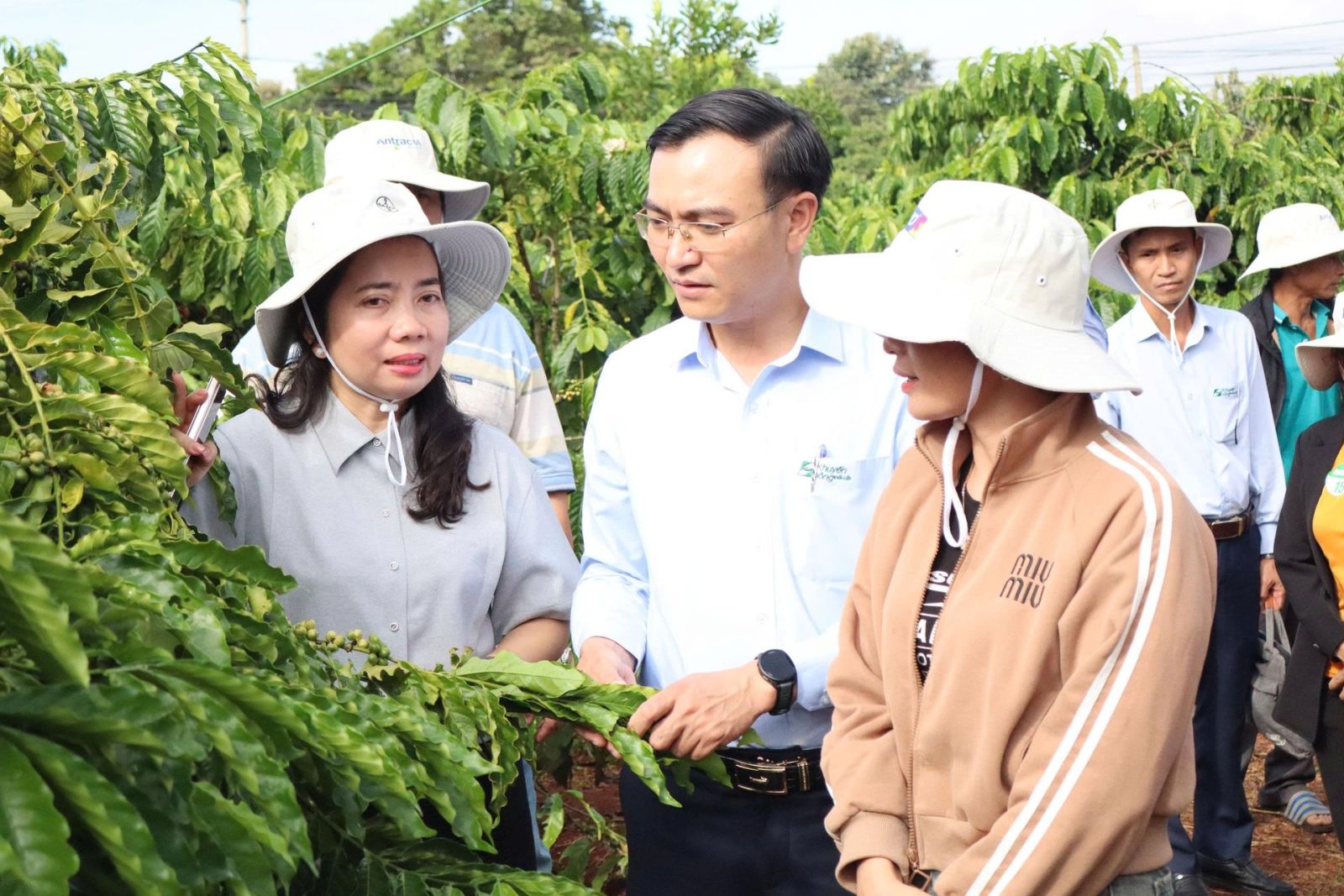- Giới thiệu
- Nhóm Công tác
- Tin tức
- Thông tin về FTA
- Tài Liệu
- Sự kiện
- Liên hệ
Plant health management helps increase coffee yield up to 15%
On October 14, the Dak Lak Provincial Agricultural Extension Center, in collaboration with Bayer Vietnam Co., Ltd., organized a seminar on the Integrated Plant Health Management (IPHM) model for Robusta coffee, with the message “The Aroma of Coffee - The Touch of Women Farmers.”
Enhancing coffee tree health
In his opening remarks at the seminar, Mr. Dinh Van Dang, Director of the Dak Lak Provincial Agricultural Extension Center, expressed hope that the IPHM program would improve farmers' coffee cultivation mindsets and practices while protecting the ecological environment.

According to the Agricultural Extension Center, in recent years, climate change and extreme weather events have reduced the yield and quality of coffee, especially in long-cultivated areas where soil has become degraded. Changes in weather patterns have also favored the spread of pests and diseases on coffee trees, making them harder to control, increasing pesticide use, raising production costs, and affecting the health of farmers and the community.
To respond to these challenges, the Dak Lak Agricultural Extension Center has cooperated with Bayer Vietnam Co., Ltd. to implement a demonstration model of Integrated Plant Health Management for Robusta coffee, with the message “The Aroma of Coffee – The Touch of Women Farmers.” The goal of the model is to evaluate the effectiveness of modern cultivation methods that support plant growth and pest prevention, while helping women farmers access new knowledge and techniques for climate-adaptive, low-pest agricultural production.
The IPHM model is being implemented from July to December 2025, applied to Robusta coffee in the production stage, covering 4 hectares across representative farms in Ea Kar, Ea M’Droh, Phu Xuan, and Ea Khal communes of Dak Lak Province. Monitoring indicators include plant growth and development, number of reserve nodes, fruit drop rate, rate of dry branches, incidence of rust disease, and yield.
According to the Dak Lak Agricultural Extension Center, the project includes evaluating the effectiveness of integrated plant health management measures for Robusta coffee, and providing technical support and consultation for women farmers in agricultural production and other household activities.
Yields increase by 10–15%
Mr. Dinh Van Dang, Director of the Dak Lak Agricultural Extension Center, said that in recent years, the Center has cooperated with organizations and enterprises to build demonstration models and conduct training sessions to transfer scientific and technological advances to farmers. Among these is the collaboration with Bayer Vietnam Co., Ltd. to implement the integrated plant health management model for Robusta coffee.
According to Mr. Dang, after two months of implementing the demonstration models following the “Three Reductions” (reduction in pesticides, fertilizers, and investment costs) and “Three Increases” (increase in yield, quality, and economic efficiency) principles, practical results have been achieved.
Field monitoring also showed that the treatment successfully reduced branch dieback, fruit drying, and premature fruit drop. No new cases of dry branches or fruit clusters were recorded, and green fruit drop decreased by 40–60% across the entire experimental area.
Applying integrated plant health management helped coffee trees grow stronger, become more resilient to environmental stress, retain fruit better, and achieve higher yields. Projected coffee yields under the model reach 3.3–4.7 tons per hectare, higher than the farmers’ control plots (3.0–4.3 tons per hectare), equivalent to an increase of 10–15%.
Affirming the role of women farmers
Regarding women's role in implementing the model, the Dak Lak Agricultural Extension Center noted that all four participating women farmers were actively involved in every production activity on their farms. They were able to plan and manage farm operations independently, and participation in the model provided them with new technical knowledge on coffee care suited to current conditions.
Implementing the Integrated Plant Health Management model for Robusta coffee has created opportunities for women to access and apply modern agricultural knowledge while combining it with health and family care, thereby improving quality of life and strengthening their role within households. It also reflects the efforts and contributions of women to building sustainable families and advancing modern, sustainable agriculture.
According to Mrs. Dang Thi Thuy, Deputy Director of the Department of Agriculture and Environment of Dak Lak Province, the most encouraging outcome is that women no longer stand outside the production chain. They have become key players in coffee farming and management.

“Gender equality is not just a slogan but an action – a prerequisite for sustainable socio-economic development, especially in farming families. To promote the sustainable growth of the coffee sector, it is essential to strengthen the role and position of women farmers,” Mrs. Thuy emphasized
Tin liên quan
PSAV Attends the 30th Anniversary Celebration of Cargill Vietnam2025/10/23
An Giang to host 2025 OCOP forum for sustainable development2025/09/25
Viet Nam and France foster cooperation on blue economy and sustainable environment2025/09/29
Agriculture and Environment exhibition ready for National celebration2025/08/27



 Điều lệ hoạt động
Điều lệ hoạt động



















































